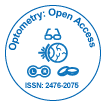Nosso grupo organiza mais de 3.000 Séries de conferências Eventos todos os anos nos EUA, Europa e outros países. Ásia com o apoio de mais 1.000 Sociedades e publica mais de 700 Acesso aberto Periódicos que contém mais de 50.000 personalidades eminentes, cientistas de renome como membros do conselho editorial.
Periódicos de acesso aberto ganhando mais leitores e citações
700 periódicos e 15 milhões de leitores Cada periódico está obtendo mais de 25.000 leitores
Indexado em
- Google Scholar
- RefSeek
- Universidade Hamdard
- EBSCO AZ
- Euro Pub
- ICMJE
Links Úteis
Diários de acesso aberto
Compartilhe esta página
Abstrato
How Do We Enhance Glaucoma Screening and Reduce Glaucoma Related Blindness?
Annamalai Odayappan, Srinivasan Kavitha, Sivagami Nachiappan, Rengaraj Venkatesh
Glaucoma is the leading cause of irreversible blindness and this burden has been projected to increase significantly in the years to come.Therefore, various steps need to be taken to tackle this problem and reduce the magnitude of blindness in the community. Screening the general population may not be feasible for glaucoma due to various reasons. This implies that we need to know who the high-risk population is so that we can do a targeted screening. The various risk factors described to be associated with delayed presentation includes older age, African-Caribbean individuals, female gender, socio-economic deprivation, poor literacy, unemployment, rural residence-greater distance from the hospital, patients referred by non-optometrists and presentation with symptoms.The prevalence of primary glaucomas is also greater among family members of known glaucoma patients. An appropriate action would be to screen people with such high-risk factors and thus diagnose glaucoma early. The other major concerns include maintaining patient’s compliance to treatment and identification of progression early. Detailed oral counselling and use of modern technology to create awareness have been suggested as aids in maintaining the follow-up. Here, we review the ways of how we could enhance glaucoma screening and maintain long-term follow up, patient care.
Diários por Assunto
- Agro e Aquicultura
- Alimentação e Nutrição
- Bioquímica
- Ciência da Computação
- Ciência de materiais
- Ciencias ambientais
- Ciências Clínicas
- Ciências Farmacêuticas
- Ciências gerais
- Ciências Médicas
- Ciências Sociais e Políticas
- Ciências veterinarias
- Economia e Contabilidade
- Enfermagem e cuidados de saúde
- Engenharia
- Engenheiro químico
- Física
- Genética e Biologia Molecular
- Geologia e Ciências da Terra
- Gestão de negócios
- Imunologia e Microbiologia
- Informática
- Matemática
- Química
Revistas clínicas e médicas
- Anestesiologia
- Assistência médica
- Biologia molecular
- Cardiologia
- Cirurgia
- Dermatologia
- Diabetes e Endocrinologia
- Doenças infecciosas
- Enfermagem
- Fisioterapia e Reabilitação
- Gastroenterologia
- Genética
- Hematologia
- Imunologia
- Medicamento
- Medicina Reprodutiva
- Microbiologia
- Nefrologia
- Neurologia
- Odontologia
- Oftalmologia
- Oncologia
- Ortopedia
- Pediatria
- Pesquisa Clinica
- Pneumologia
- Psiquiatria
- Toxicologia

 English
English  Spanish
Spanish  Chinese
Chinese  Russian
Russian  German
German  French
French  Japanese
Japanese  Hindi
Hindi